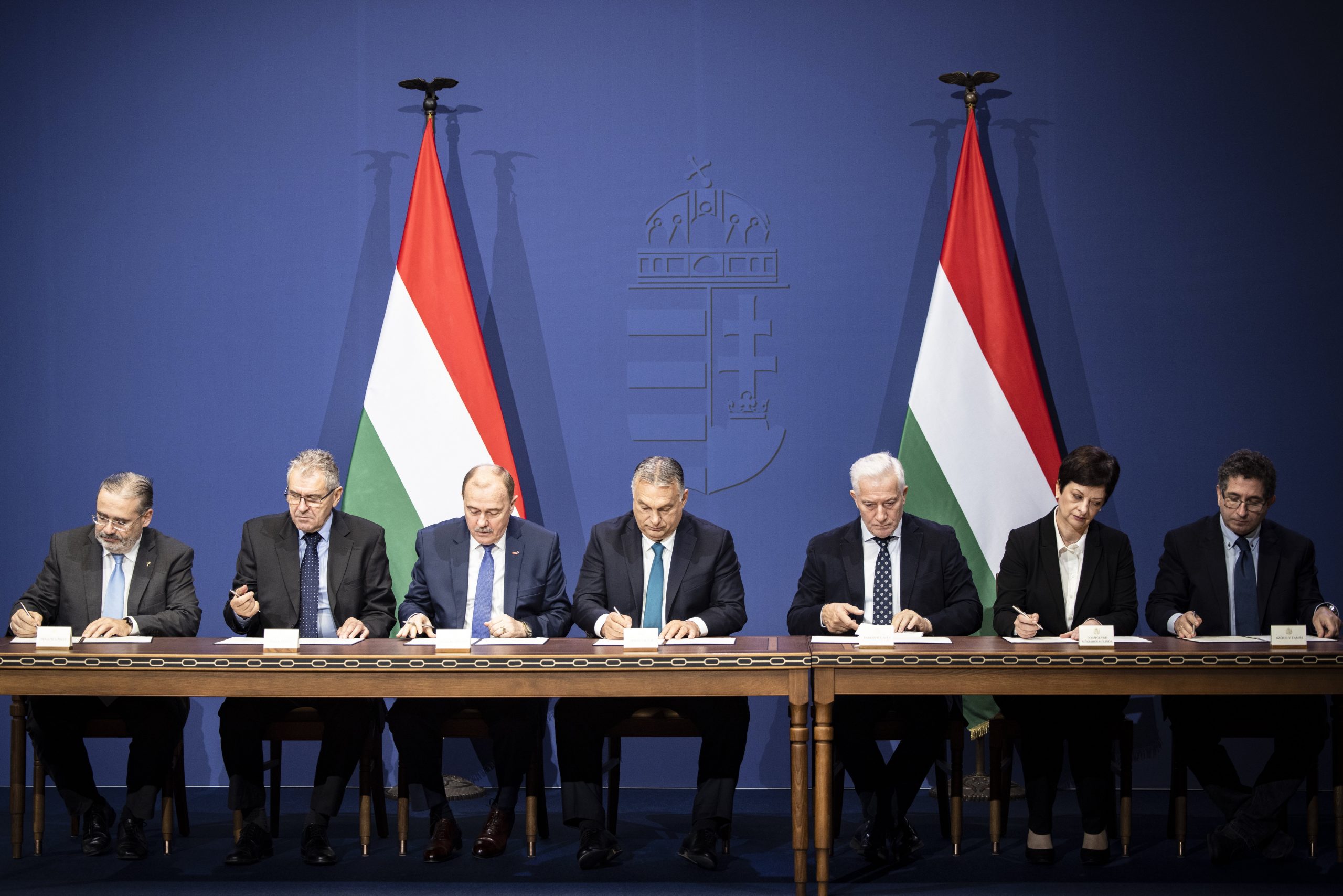
At the event held in the Carmelite Monastery for the ceremonial signing of the document, he said at the beginning of their term in government, their most important pledge was to create a workfare economy. If there is work, there is everything, that was the starting point, he recalled. He observed that the taxes on live work are decreasing continuously; since 2010 in Hungary, taxes levied on live work have been reduced by a quarter.
The Prime Minister highlighted that the minimum wage is a minimum three-factor equation: there are workers who would like higher wages, there are employers who want to preserve their competitiveness, and there is the government whose duty it is to keep the country’s finances in order. In order for wages to increase, to maintain competitiveness and to also keep finances in order, there is a need for some tact, he said.
He stressed that after 2010 they realised that instead of smart ideological approaches, it was necessary to place the representation of the people at the centre of governance in order to create a common ground, on the foundations of which it was possible for trade unions and employers to strike a deal.
The Prime Minister said there is robust economic growth in Hungary, one of the highest in Europe, and there is hard work behind that achievement. This growth is every Hungarian’s common success, and so everyone will receive a share of it, including pensioners, he stated.
He said the guaranteed wage minimum will increase to HUF 260,000, while the minimum wage will rise to HUF 200,000. Together with the minimum wage, the wages of those participating in public works schemes will also increase significantly, he added.
He said work is a good thing, provided that it is fairly remunerated. Between 2002 and 2010 in Hungary, the real value of the minimum wage decreased by 2 per cent, while in the other V4 countries there was a 30 per cent increase, he said.
He stressed that after 2010 the most important task was to break with the practice of low minimum wages, to offer work instead of benefits so that everyone who can should have the possibility to work, and to ensure that work is rewarded not only morally, but also financially.
He said it testifies to the success of this approach that in the past 12 years the minimum wage has increased by 172 per cent in total; this is the biggest success of the Hungarian trade union movement. The fact that everyone is able to work is a major achievement that employers can take credit for, while it is the government’s success that state finances are in order, he listed.
According to Mr Orbán, a concomitant of every wage agreement is not only a rise in minimum wages, but equally the reduction of the taxes and contributions payable by employers. If taxes are reduced, businesses are able to give those savings to their workers, more money is left with businesses, and so more money can be left with families, he pointed out.
He took the view that that extra money will lead to new jobs and rising salaries which will eventually further increase the economy’s performance. The Archimedean point of today’s entire workfare economy is a tax regime that is capable of boosting competitiveness; with tax cuts, the government created the opportunity for conducting annual negotiations about how much wages can be raised by, he explained.
The Prime Minister also said the government offered trade unions and employers an alliance, “we offered an alliance of action to the realm of work”. The raising of the minimum wage and the guaranteed wage minimum also pushes average wages up, and so today’s news is good news not only for those living off the minimum wage and the guaranteed wage minimum, but for everyone who works, he pointed out.
Minister for Innovation and Technology László Palkovics stressed that they have recently achieved extraordinary results because Hungarians want to live off work, not benefits. They also achieved results during the pandemic, the government’s measures appear to work, the Hungarian economy is among the best once again, he pointed out, adding that employment, too, has got over the pandemic. He observed that the Hungarian unemployment rate is among the lowest in the EU.
He said wages have increased continuously since 2010, and even during the pandemic this process did not stop. There was significant demand for raising the lowest wages, and the people themselves support the minimum wage increase, he explained.
He said with this measure – which is about the improved prestige of workers – Hungarian families can claim an even bigger share of the growth of the economy. At the same time, the reduction of taxes provides ample compensation for employers, he said.
President of the National Federation of Workers’ Councils Imre Palkovics highlighted that it was also important to raise the minimum wage in order to reduce the gap between the minimum wage and the average wage. If there are meaningful talks, there are also significant results, he stated.
He said 300,000 people work for the minimum wage, while the guaranteed wage minimum of skilled workers affects 800,000 persons. He said they developed an agreement model which is equally predictable for workers and employers.
Vice President of the Confederation of Hungarian Employers and Industrialists Ferenc Rolek said they are optimistic about this agreement because it indicates that they expect the present economic growth to continue, and will be able to raise the funds for the increased wages.


